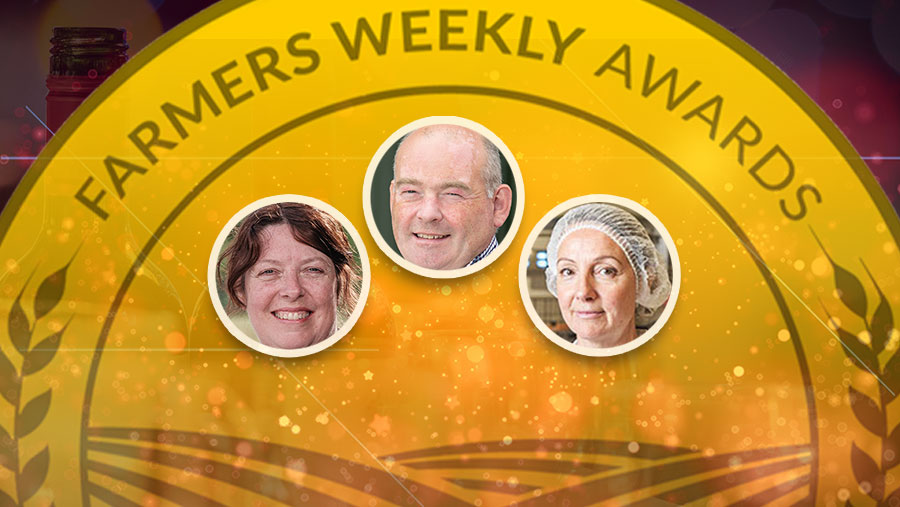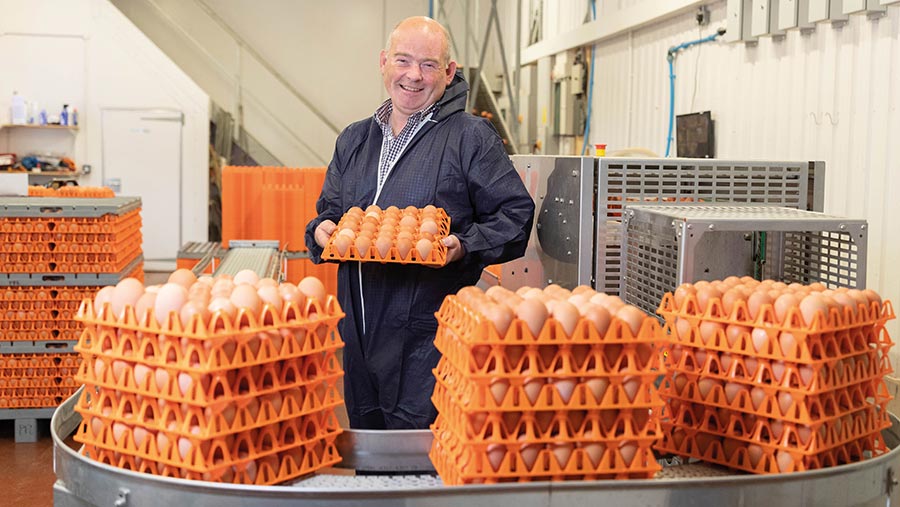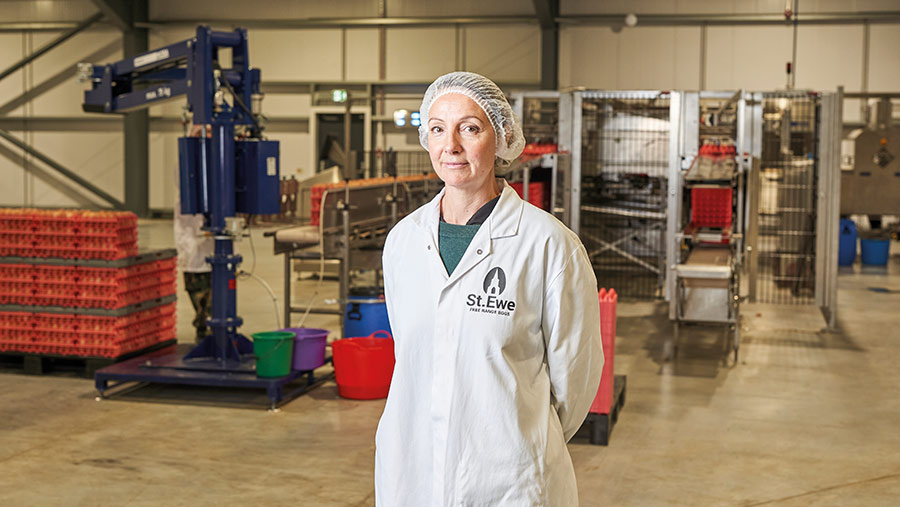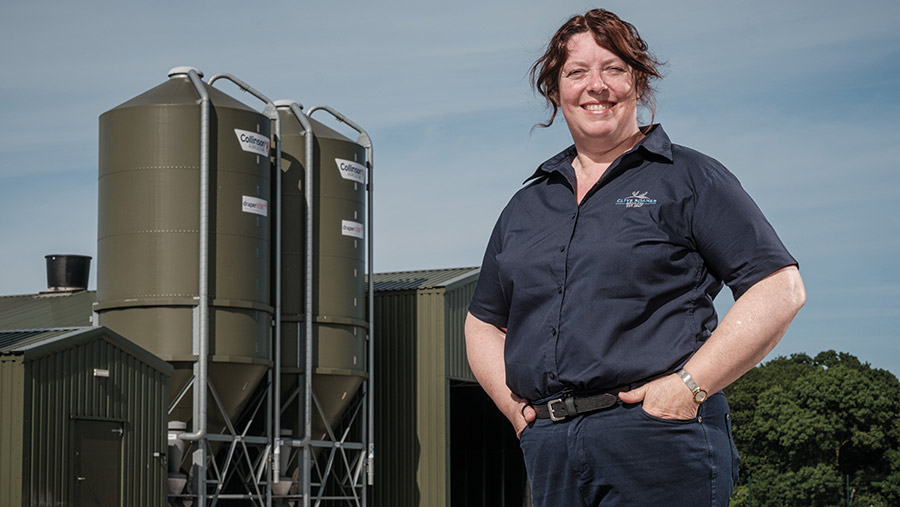Farmers Weekly Awards 2022: Poultry Farmer of the Year finalists

Strong marketing, tight business control and high-quality production characterise all three finalists in this year’s poultry category, which covered both the egg laying and broiler growing sides of the industry.
The judging team visited each of the finalists for a three-hour interview and tour of their systems.
See all of the category finalists for the 2022 Awards
The finalists:
Richard Pinfield
Bromsgrove, Worcestershire
St Ewe Free Range Eggs
Grampound Road, Cornwall
Clive Soanes Broilers
Lund, Yorkshire
The judges:
Craig Michie
Last year’s winner
Philip Clarke
Farmers Weekly executive editor
Aimee Mahony
NFU chief poultry adviser
Richard Pinfield
Bromsgrove, Worcestershire

Richard Pinfield © Jim Varney
From small beginnings with just 20 birds on a smallholding in 2011, Richard has steadily built up his egg laying business, first focusing on free-range, then adding barn production to the enterprise.
“I started from scratch when I was at school with a few cattle and sheep, but I always knew I wanted to farm,” he says.
Richard’s early career was actually spent working for other farmers and contractors.
But when his young daughter complained that she never saw her father, he decided the time had come to set up on his own – and poultry ticked the box.
Business focus
Continually thinking about how to improve, making small changes when needed, and keeping detailed records are the basic principles upon which Richard has built his business.
Taking outside advice is also fundamental, with Richard having spoken to a veritable “who’s who” of the egg sector before deciding on the equipment needed, applying for planning, and approaching the bank to set up his first shed.
It soon became clear that 24,000 hens was not enough to support a family, so in 2016 a 32,000 bird, double-decker barn unit was added.
Initially, Richard’s eggs were sold to Lloyds, but the addition of barn eggs meant a change of packer was required, with most production now going to Lidl, via Oaklands, although the farm has recently had a Tesco audit.
“The packers tell us that the customer needs Large and Extra Large eggs, so this is what we supply,” says Richard.
Egg size and shell quality are monitored closely, with any seconds taken to processor Bumble Hole Foods, five minutes down the road.
The farm also supplies a number of small shops and businesses from the farmgate, most of whom are happy to take trays of mixed eggs, which helps the bottom line.
Richard says his business sense is strongly focused on profitability, not tradition. “I’m not afraid to stop doing something if it’s not generating a positive on the profit-and-loss sheet,” he says.
Staff management is another priority. Richard says his family were originally Cadbury employees in the early 19th century, and those employment ethics extend to his own workforce today.
Technical
Egg production in the free-range unit is based around a Vencomatic Bolegg multi-tier system, with additional ramps added to improve access to feed, water and nest boxes.
Getting the birds off to a good start is key. “I rigorously set aside time for the first seven days to ensure the birds get up at night, and walk the sheds three times a day to monitor water and feed consumption.”
Richard describes himself as a “pioneer”, having been one of the first to demand that his pullet supplier use perches when rearing his birds, to get them used to the multi-tier system.
In recent years, Richard has also added LED lighting to the sheds, which helps egg production, and a “dawn to dusk” lighting system.
“I believe that the more closely we mimic the birds’ natural environment, the calmer they will be – and calm birds tend to be healthier and more productive,” he says.
Record keeping is also fundamental. “Keeping meticulous records means we can really focus on changes that can improve both bird health and production,” he says.
Such attention to detail is rewarded by impressive bird performance figures, with the free-range birds producing 340 eggs at 74 weeks, based on a feed intake of 127g/bird a day – well above standard.
Future plans
With expansion in mind, Richard is keen to invest in another free-range shed, and is also looking to install storage batteries on the farm, to make more use of the energy generated.
He is keen to continue improving bird performance. One aspect of this is a trial of a new red mite control product, administered through feed – a project he is working on in partnership with feed supplier Humphrey Feeds.
“I am also working to make the farm more sustainable. We need to care for the environment alongside our birds, and the people who work here,” he says.
A new carbon audit will provide the baseline, from which further reductions in the farm’s environmental impact will be assessed.
What the judges say
A self-starter, with a determination to succeed, Richard has never been afraid to seek outside help when needed. Combined with a strong work ethic, this has helped him create a thriving business.
Richard Pinfield summary
The judges liked
- Real focus on bird welfare and biosecurity
- Willing to seek outside advice, but still thinks outside the box
- Profitable business, despite current challenges
- Placements offered to vet students
- School visits actively encouraged
Farm facts
- Two free-range flocks – 12,000 Lohmann Browns and 12,000 H&Ns
- Second two-tier shed for barn eggs
- 36ha of land, with small beef herd
- 165KW solar panels on two sheds
- New IWS water sanitation system installed
The numbers
- 56,000 barn and free-range laying hens
- 4 full-time employees
- 600 additional trees planted on the farm
- 40% of solar energy generated is returned to National Grid
- 4,800 eggs sold each week from the farm gate
St Ewe Free Range Eggs
Grampound Road, Cornwall

Rebecca Tonks of St Ewe Poultry © Oli Lees
Educating consumers on the importance of provenance, combined with an open approach to business, and high hen welfare are three of the principles at St Ewe Free Range Eggs, which has continued to expand, despite the challenges of Covid-19 and avian influenza.
Now headquartered at its new packing centre at Grampound Road, between Truro and St Austell, the firm is geared up to handle 200,000 eggs a day from farms across the South West and Wales.
It is a far cry from 2007, when Rebecca Tonks launched the small family business with her parents based on the eggs from 13,900 hens supplying Asda and Sainsbury’s.
Business focus
A premium price for a premium product is a key aim at St Ewe, whose customers include all four major supermarkets, as well as local retailers, hospitality and catering outlets.
“We also continues to grow in the e-commece sector, which has seen incredible growth as a result of the Covid-19 pandemic and a shift in consumer buying behaviour,” says Rebecca.
All eggs meet Red Lion Code standards, and there is a strong emphasis on branding, with more than £70,000 invested in marketing in 2020.
The Rich Yolk brand, developed in partnership with Humphrey Feeds, is now supplied to some of the country’s top restaurants, while Super Eggs were also launched during the pandemic to deliver on health and wellbeing.
Deliveries are made using the company’s own fleet of vehicles and third-party hauliers, while a pasteuriser has been installed at St Ewe’s original home – Ventowyn Farm, Tregony – using farm “seconds” to produce a range of liquid products.
Such efforts and tight cost control have enabled the company to go from its first ever loss – during Covid – to its largest-ever profit in 2021-22.
It’s not all about profit, however, and social responsibility is also taken seriously at St Ewe. Faced with a loss of customers during Covid lockdowns, the company launched its “Shell Out to Help Out” campaign, selling eggs at cost price to the local community.
It also donated some 250,000 eggs to food banks.
Under a new charitable initiative called “the Bakers Dozen”, every 13th egg sold to retail is now donated to food banks.
Technical
Despite an overall dependence on contract producers, production at Rebecca’s home farm continues, with 7,200 free-range hens kept on flat deck systems, with winter gardens attached.
These birds are used for trials of diets, as new brands are developed.
“We would never ask our farmers to trial feeds and processes unless we had previously fully researched all potential knock-on effects,” says Rebecca.
Biosecurity is a top priority, especially as St Ewe’s egg pasteuriser is based at Ventowyn and any outbreak of avian influenza would shut down of the whole facility.
The painful decision was taken in January to deplete the two flocks mid-term, although new birds will be coming soon.
Maintaining high standards is also paramount for the 17 contract producers, so a new “head of poultry” role has been created.
The EggBase software system has been installed, to help contracted farmers benchmark their data, and annual farmer open days are held, to share best practice.
All producers are required to use the same feed, to ensure consistency of product, although they can choose their own pullet supplier, breed and vet arrangements.
Future plans
The new packing centre, housing a new Moba Omnia 330 grader, provides the foundation to take the business to the next level, with plans to triple turnover in five years.
“We are planning on increasing employment opportunities in the local area by adding another 15 team members – 33% – over the next few years,” says Rebecca.
This will require additional egg production and Rebecca is constantly on the lookout for suitable candidates, who are largely found through word of mouth and recommendations.
Low-carbon egg production is another objective, although the make-up of poultry feed means that true “net zero” is unlikely to be obtainable for a while yet.
But Rebecca insists that, however much it grows, the company will always focus on the same core values of openness, quality, customer service and social awareness.
What the judges say
As the business has expanded and taken on more producers and bigger customers, it has not lost sight of its more humble beginnings, adhering to family values and aiming to do the right thing.
St Ewe Free Range Eggs summary
The judges liked
- Family business feel, despite significant expansion
- Ambitious expansion targets
- Commitment to local community
- Focus on quality and strong branding
- Willingness to innovate
Farm facts
- Family owned business, with management team recruited
- Owned free-range hens used for trialing new diets
- Majority of eggs from contracted producers
- New £4.8m packing centre just opened
- Egg pasteuriser used to add value to seconds
The numbers
- 17 Number of contracted suppliers
- 76 Average age of flocks at depletion
- 250,000 Eggs donated to charity during Covid
- 100 Percent of eggs taken from contracted producers during Covid
- 50,000 Square footage of new packing centre
Clive Soanes Broilers
Lund, Yorkshire

Claire Wright of Clive Soanes Broilers © Jim Varney
Embracing change while maintaining a focus on the traditional values of quality and service have been among the factors driving an improved technical and financial performance at Clive Soanes Broilers, the farming side of processing business Soanes Poultry.
Owned by the Soanes family, the company runs six of its own farms in and around the Yorkshire Wolds, with two more growers on contract.
All eight farms are within 22 miles of the factory at Middleton on the Wolds in East Yorkshire, with oven-ready birds and cuts supplied to consumers throughout Yorkshire, and beyond, using the firm’s own drivers and refrigerated vehicles.
“We pride ourselves on rearing Yorkshire’s tastiest chickens,” says managing director Claire Wright.
Business focus
Since Claire arrived in 2020, the farming side has been subject to a major restructuring. Instead of having an area farm manager, the company now employs a Harper Adams University graduate, Emily Hughes, as a poultry health specialist, advising individual farm managers on flock health care.
A new farms and poultry supervisor, Melanie Jackson, provides back-up relief on the farms, with a particular role of ensuring all Red Tractor, health and safety, and other audits are observed at all sites.
A previous area manager is now responsible for ensuring efficient turnaround on farms, which has fallen from 70 days to 63 days on average.
“It is very much a team effort, and efficiencies have been improved by closer co-ordination and good working relationships,” says Claire.
There is also an emphasis on getting the farming message out to the general public, with the company using social media to illustrate good practice, including farmer stories on the Soanes Poultry web page, and named farmers on chicken labels.
Cost control is an ongoing challenge, but this has not stymied investment, with the main Horn Hill site recently rebuilt at a cost of £2.8m, and a previously rented farm purchased in 2021 for £1.9m.
Overall, the business has remained profitable, thanks in part to the Renewable Heat Incentive.
Technical
Each farm site has its own dedicated farm manager, with birds stocked at either 38kg/sq m maximum for standard production, or 30kg/sq m for a more premium catering outlet.
As an ex-accountant, Claire is a stickler for data, with spreadsheets helping her keep a close eye on bird performance across all production sites, and enabling farm managers to track their own results against group averages.
One example of how this pays dividends is with factory rejects.
An analysis of factory data allowed the team to prioritise areas in need of urgent attention, leading to a drop in the number of rejects – from 1.9% to 1.7% in the past year.
Biosecurity is a top priority, given the ongoing threat from avian influenza.
Site managers have been trained, and internal audits are carried out to ensure standards are maintained. “We only recruit managers who have bird welfare at the top of their priorities,” says Claire.
With a number of new site managers in place, it has been pleasing to see the average European Production Efficiency Factor (EPEF) climb from 380 in 2020 to 383 in 2021, while three of the firm’s managers recently joined the Ross 420 Club (for flocks with an EPEF above 420), placing them in the top 1% of the industry.
Future plans
Further expansion is very much part of the business plan, with the factory looking to take up to 145,000 birds a week, compared with the current 125,000-135,000.
Plans are in place for two more sheds at the firm’s Green Lane site, though Claire says she wants an extra farm as well.
She is also keen to bring more people into the poultry sector, by offering a placement for an Edinburgh University vet student and a Harper Adams University scholarship student.
“If I can bring young people into the industry, and keep them there, that is probably the biggest thing I can do,” she says.
Other forward-looking objectives include further improvements in profitability, even better bird welfare, and a continued reduction in antibiotics use.
“We aim to become the grower of choice for the consumer, by communicating the benefits of provenance and quality across all channels,” says Claire.
What the judges say
With three motivated women in the senior management team, this regional poultry enterprise has benefited from a significant restructuring, with tighter controls and good team spirit that have combined to carry the business forward.
Clive Soanes Broilers summary
The judges liked
- Willingness to embrace change and secure staff “buy-in”
- Close collaboration with factory personnel to understand consumer needs
- Openness with the general public through visits and social media
- Retained a marketing agency to ensure strong brand messaging
Farm Facts
- Six owned farms and two contracted farms delivering 125,000-135,000 birds a week
- Straw burner to heat Horn Hill Farm, biomass boilers and solar panels at other sites
- Own fleet of delivery vehicles
- Online shop for higher-welfare chicken
The numbers
- 650,000 broilers kept on the firm’s own farms
- 10,000 birds kept at lower stocking rate of 30kg/sq m
- 2 farms with public viewing galleries
- 18 mile radius for owned farms from the factory
